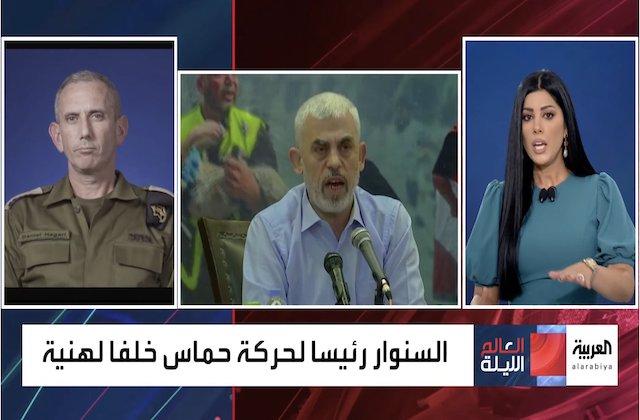In a bold and unyielding declaration, Israel has vowed to eliminate Yahya Sinwar, the newly appointed leader of Hamas. This declaration comes as global powers, including the United States and its allies, fervently urge restraint to prevent further escalation in the already volatile Middle East.
A Clear Message from Israel
Daniel Hagari, spokesperson for the Israeli military, delivered a stark message via Al-Arabiya, stating, “There is only one place for Yahya Sinwar, and it is beside Mohammed Deif and the rest of the October 7 terrorists. That is the only place we’re preparing and intending for him.” This statement underscores Israel’s resolute stance against the leaders of Hamas following the recent violent confrontations.
IDF Spokesperson, Daniel Hagari reacts to Sinwar’s appointed position: "There is only one place for him - next to Mohamed Deif and all the terrorists responsible for the oath of October." pic.twitter.com/mty0m37mti
— Shiri_Sabra (@sabra_the) August 7, 2024
Just last week, Israel announced it had successfully killed Mohammed Deif, a founding figure of Hamas’s military wing, in a strategic air raid in southern Gaza. Deif’s demise was a significant blow to Hamas, and Israel’s focus has now shifted to Sinwar, the mastermind behind the brutal October 7 attacks which ignited the current conflict.
Leadership Changes and Their Implications
Sinwar was appointed the new leader of Hamas after his predecessor, Ismail Haniyeh, was reportedly killed in an Israeli strike in Iran last week. The appointment of Sinwar, known for his hardline approach, further complicates the already tense situation. Hezbollah commander Fuad Shukr was also assassinated in Beirut, adding another layer of complexity to the regional dynamics.
With both Tehran and Hezbollah vowing retaliation for these high-profile killings, the specter of an all-out regional war looms large. In a bid to stave off such a scenario, world leaders are pressing for de-escalation. U.S. President Joe Biden has been actively engaged in discussions with the leaders of Egypt and Qatar, pushing for an immediate ceasefire and the release of hostages as a path toward peace.
IDF Spokesperson, RDML Daniel Hagari, in an interview for Al-Arabia: “Yahya Sinwar is a terrorist, who is responsible for the most brutal terrorist attack in history - October 7th. There is only one place for Yahya Sinwar, and it is beside Mohammed Deif and the rest of the… pic.twitter.com/Hkwgwwkbee
— Joe Truzman (@JoeTruzman) August 6, 2024
International Reactions and Calls for Ceasefire
On Tuesday, Israeli warplanes made a powerful statement by breaking the sound barrier over Beirut, coinciding with Hezbollah leaders’ addresses in the Lebanese capital. Daniel Hagari reiterated Israel’s unwavering position, emphasizing that Sinwar’s fate would mirror that of other Hamas figures who have been eliminated by Israeli forces.
The selection of Yahya Sinwar, a pivotal figure in orchestrating the October 7 attacks on Israel, as Hamas’s new leader, has been perceived as a significant obstacle to ceasefire negotiations. Lina Khatib, a renowned analyst from London’s Chatham House think-tank, highlighted this challenge, stating, “The killing of Haniyeh already brought negotiations back to the drawing board. This next chess move by Hamas makes negotiations even trickier.”
However, not all analysts share this pessimism. Sadeq Abu Amer, head of the Palestinian Dialogue Group, based in Turkey, posited that Sinwar’s elevation might still leave room for diplomacy. He suggested that Sinwar, in his new role, “might take a step that will surprise everyone.”
The Role of International Diplomacy
U.S. Secretary of State Antony Blinken has underscored the critical role that Sinwar now plays in the peace process. Blinken remarked, “Sinwar has been and remains the primary decider when it comes to concluding the ceasefire.” He emphasized the responsibility that now rests on Sinwar’s shoulders to facilitate a ceasefire that could bring much-needed relief to the beleaguered population of Gaza.
Sinwar’s appointment follows the killing of Ismail Haniyeh in Iran, marking a significant shift in Hamas’s leadership dynamics. As the group’s top official in Gaza and the architect of the recent attacks, Sinwar’s decisions will be pivotal in the coming days. Blinken’s call to Sinwar was clear: the decision to pursue peace is in his hands, a choice that could significantly alter the course of the conflict.
To conclude, as Israel intensifies its stance against Hamas’s new leadership, the international community’s calls for restraint and diplomacy grow louder. The coming days will be crucial in determining whether the region steps back from the brink of widespread conflict or plunges deeper into violence.


